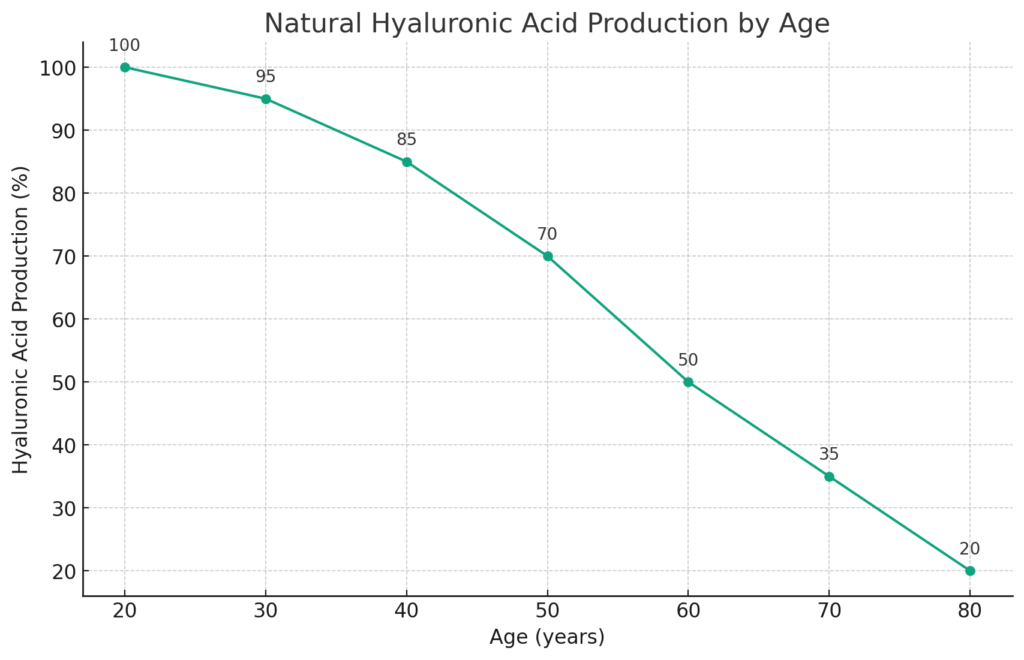What is Hyaluronic Acid?
Hyaluronic acid. You've probably heard the name buzzing around the skincare industry. But what exactly is it? Often referred to as hyaluronan or hyaluronate, this gooey, slippery substance is produced naturally by your body. It's not just a fad; it's a biological superstar.
The Presence in Your Body
Your body is a treasure trove of hyaluronic acid. From your eyes to your joints, and especially in your skin, this multitasking molecule is hard at work. It plays a pivotal role in maintaining the health and functionality of various tissues.
| Body Parts | Role of Hyaluronic Acid |
|---|---|
| Eyes | Lubrication |
| Joints | Smooth Movement |
| Skin | Hydration & Flexibility |
Benefits of Hyaluronic Acid
Joint Health
You love to move, right? Whether it's grooving on the dance floor or reaching for that top shelf, your joints are your silent partners. One of the standout benefits of hyaluronic acid is its ability to keep those joints in top form.
Acting as a lubricant, it prevents the bone-grinding action that could lead to pain and injury.
Skin Hydration
We all want that dewy, fresh look. Thanks to hyaluronic acid's exceptional water-retaining capacity, your skin can achieve just that. Picture this: it can hold up to one and a half gallons of water per quarter-teaspoon! No wonder it's a sought-after ingredient in skincare products, including lip fillers.
Skin Flexibility and Anti-Aging
Aging is inevitable, but looking your age isn't. Here's where hyaluronic acid's anti-aging properties come into play. It helps maintain skin flexibility and can even reduce wrinkles.
Plus, it's effective in speeding up wound healing. This makes it a multifaceted tool for overall skin health and appearance.

How Hyaluronic Acid Is Made
Bacterial Fermentation
Curious about how this golden substance is made? One popular method is bacterial fermentation. Yes, you read that right. Scientists use the power of bacteria to create this skincare elixir.
Bacterial fermentation ensures a high concentration and purity of hyaluronic acid, making it safe for use.
Rooster Combs as a Source
Hold onto your feathers! Another source of hyaluronic acid is rooster combs. These red, fleshy protuberances on a rooster's head are rich in naturally occurring hyaluronic acid. But before you start chasing down farm birds, rest assured, the extraction process is ethical and contributes to the quality of the substance.
Safety of Hyaluronic Acid
Rare Reactions and Adverse Effects
Wondering about the safety of hyaluronic acid? Generally speaking, it's considered safe. However, there are rare reactions and adverse effects to watch out for, such as redness or slight pain at the injection site when used for botox treatment.
Use During Pregnancy and Nursing
Is it safe during pregnancy or nursing? The consensus leans towards 'yes,' but as always, consult your healthcare provider for personalized advice.
Interactions with Other Products
You may be tempted to mix and match your skincare products. But be cautious. Hyaluronic acid interactions with other products can sometimes lead to unexpected results. Always talk to a healthcare provider before making any changes to your regimen.
Water Retention Connected to Weight Gain
Let’s address the elephant in the room: does hyaluronic acid cause weight gain due to water retention? You're not alone if you've heard this myth circulating. Given its exceptional ability to hold water—up to 1,000 times its weight in water, to be precise—people often jump to the conclusion that it may contribute to weight gain.
The Science: Molecular Structure and Water Retention
To understand this better, let’s dive into the molecular structure of hyaluronic acid. This gooey substance has a unique configuration that enables it to retain enormous amounts of water. However, the water retention we're talking about is localized.
This means the hyaluronic acid retains water mainly in your skin and joints, contributing to hydration and lubrication rather than an increase in body weight.
| Factor | Explanation |
|---|---|
| Molecular Structure | Enables water retention but localized mainly to skin and joints. |
| Water Weight | Does not contribute to overall body weight gain, contrary to popular belief. |
Real-World Examples: Skin Care and Joint Health
For instance, when used in skincare products like serums and lip fillers, the water retention is beneficial for skin hydration, not for adding extra pounds. In joint health, the lubrication provided by hyaluronic acid is crucial for smooth movement and pain relief but doesn't translate to weight gain.
Consult Your Healthcare Provider: Individual Variability
As always, individual experiences may vary. If you have concerns about water retention and weight gain, the best course of action is to consult a healthcare provider. They can provide medical advice tailored to your specific needs and health conditions.
Different Forms of Hyaluronic Acid
Oral Supplements
You can take hyaluronic acid in various ways. One popular route is through oral supplements. They offer benefits like relief from arthritis pain and improved skin health. However, consult your healthcare provider for the best dosage and form that suits you.
Topical Products for Skin
Skincare is an art, and hyaluronic acid is one of its finest mediums. From serums to shampoos, the topical application of hyaluronic acid can significantly improve your skin's appearance and hydration levels.
Eye Drops
Dry eyes can be a real dampener. But worry not, hyaluronic acid comes to the rescue in the form of eye drops. These can bring much-needed relief and are often recommended by healthcare providers.
Intimate Use
Let's get personal for a moment. Hyaluronic acid is also available in gels, creams, and lubricants for vaginal dryness and pain, especially during menopause.
How Hyaluronic Acid Works
Transporting Molecules in the Body
Hyaluronic acid isn't just a one-trick pony. It also plays a role in transporting molecules throughout the body. This makes it a key component in targeted medication delivery systems.
Scaffold Structure for Tissue Growth
Beyond hydration, hyaluronic acid serves as a scaffold structure, aiding in tissue growth and wound healing. This is especially crucial in medical treatments involving tissue repair and regeneration.
Effectiveness of Hyaluronic Acid
Skin Health and Flexibility
Long-term use of hyaluronic acid can significantly improve your skin's health and flexibility
. It's an asset in your skincare routine, and its effectiveness is backed by numerous studies.
Acne Treatment
While not a primary treatment for acne, hyaluronic acid can be used in fillers to repair or conceal acne scars. However, its effectiveness in treating acne directly is still under study.
When to Consult a Healthcare Provider
Skin Health
If you're facing persistent skin issues, it's crucial to consult a healthcare provider. Hyaluronic acid could be a part of the solution, but professional advice is irreplaceable.
Eye Health
Dry eyes can be more than a minor annoyance. They could indicate underlying issues. If over-the-counter hyaluronic acid eye drops aren't solving the problem, it's time to consult a healthcare provider.
Conclusion and Expert Advice
You've journeyed through the fascinating world of hyaluronic acid. From its role in skin hydration and joint health to its various forms and safety considerations, it's clear that this substance is more than just a trend. Remember, your health and safety should always come first.
Before making hyaluronic acid a part of your healthcare regimen, consult a healthcare provider for tailored advice.
So go ahead, explore the benefits of hyaluronic acid, but always with caution and the right guidance. Your body will thank you!
That wraps up our comprehensive guide to hyaluronic acid. Whether you're looking to boost your skincare routine, improve joint health, or just understand this versatile substance better, this guide has got you covered.
FAQ Section
Does hyaluronic acid make you retain water?
Contrary to what you might think, hyaluronic acid doesn't make you retain water in a way that leads to bloating or weight gain. It retains water in the skin, providing hydration and elasticity.
Does hyaluronic acid cause bloating?
No, hyaluronic acid does not cause bloating when used topically or taken as an oral supplement. The water retention is localized to the area of application or targeted treatment.
Can you overdo it with hyaluronic acid?
Yes, like anything, moderation is key. Excessive use may lead to skin irritation or redness. Always follow the recommended dosage or application guidelines provided by healthcare professionals.
What happens if you use too much hyaluronic acid?
Using too much can result in skin irritation and negate the benefits. Less is often more when it comes to this potent substance.
Who shouldn't use hyaluronic acid?
Individuals with known allergies to hyaluronic acid or any of its components should avoid it. Also, if you're pregnant or nursing, consult a healthcare provider before use.
Is hyaluronic acid dehydrating?
No, quite the opposite. Its primary function is to hydrate the skin. However, in very arid conditions, it might draw moisture from deeper layers of the skin, so it's best used with a moisturizer in such environments.





